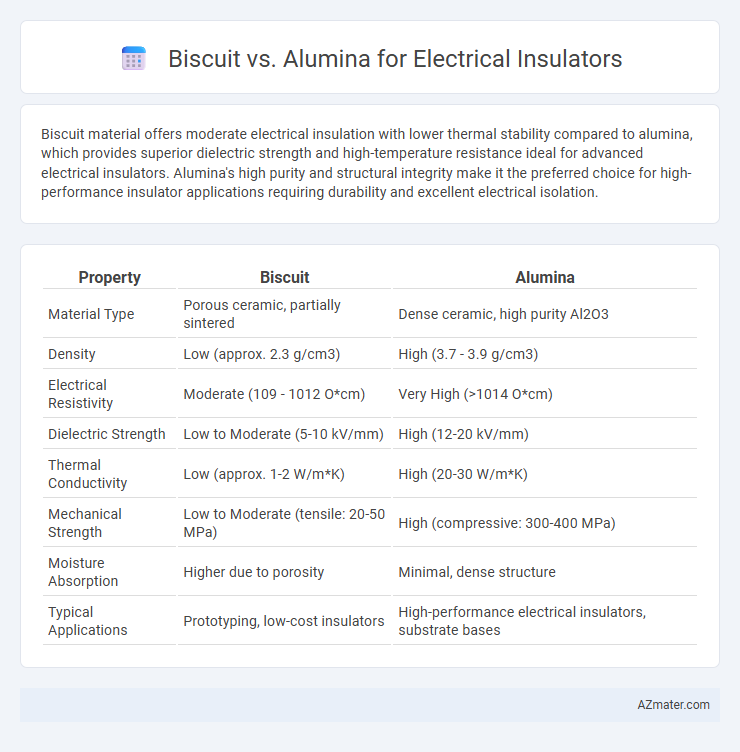Biscuit material offers moderate electrical insulation with lower thermal stability compared to alumina, which provides superior dielectric strength and high-temperature resistance ideal for advanced electrical insulators. Alumina's high purity and structural integrity make it the preferred choice for high-performance insulator applications requiring durability and excellent electrical isolation.
Table of Comparison
| Property | Biscuit | Alumina |
|---|---|---|
| Material Type | Porous ceramic, partially sintered | Dense ceramic, high purity Al2O3 |
| Density | Low (approx. 2.3 g/cm3) | High (3.7 - 3.9 g/cm3) |
| Electrical Resistivity | Moderate (109 - 1012 O*cm) | Very High (>1014 O*cm) |
| Dielectric Strength | Low to Moderate (5-10 kV/mm) | High (12-20 kV/mm) |
| Thermal Conductivity | Low (approx. 1-2 W/m*K) | High (20-30 W/m*K) |
| Mechanical Strength | Low to Moderate (tensile: 20-50 MPa) | High (compressive: 300-400 MPa) |
| Moisture Absorption | Higher due to porosity | Minimal, dense structure |
| Typical Applications | Prototyping, low-cost insulators | High-performance electrical insulators, substrate bases |
Introduction to Electrical Insulators
Electrical insulators are materials that prevent the flow of electric current by offering high resistance and are essential for maintaining safety and efficiency in electrical systems. Biscuit insulators, typically made from fired clay or porcelain, provide excellent mechanical strength and thermal stability, making them suitable for outdoor power lines and heavy electrical equipment. Alumina insulators, composed of high-purity aluminum oxide, exhibit superior electrical insulation properties, high dielectric strength, and resistance to abrasion, thereby enhancing performance in high-voltage applications and harsh environments.
What is a Biscuit Insulator?
A Biscuit insulator is a type of electrical insulator made primarily from porcelain or ceramic materials, shaped like a small disc or "biscuit" used in power transmission and distribution lines to provide electrical isolation and mechanical support. Compared to Alumina insulators, Biscuit insulators offer good insulating properties and mechanical strength but generally have lower thermal conductivity and durability under high-stress environments. Alumina insulators, made from aluminum oxide, exhibit superior electrical insulation, higher mechanical strength, and better resistance to high temperatures, making them ideal for more demanding electrical applications.
What is an Alumina Insulator?
An alumina insulator is a high-performance electrical insulator composed primarily of aluminum oxide (Al2O3), known for its excellent thermal conductivity, high dielectric strength, and superior mechanical properties. It offers enhanced durability and resistance to moisture, chemicals, and high temperatures compared to traditional biscuit insulators made from porcelain or ceramic materials. Alumina insulators are widely used in high-voltage and industrial applications due to their reliability and efficiency in maintaining electrical isolation under extreme conditions.
Material Composition: Biscuit vs Alumina
Biscuit insulators are primarily composed of natural clay mixed with specific additives to enhance mechanical strength and electrical resistance, while alumina insulators are made from high-purity aluminum oxide (Al2O3) ceramics, offering superior dielectric properties and thermal stability. The ceramic alumina's crystalline structure provides enhanced insulation against high voltage and temperature compared to the more porous and less dense biscuit material. Alumina's chemical inertness and hardness result in longer-lasting insulators ideal for high-voltage applications, contrasting with biscuit insulators' lower cost but reduced performance in extreme electrical environments.
Dielectric Strength Comparison
Biscuit insulators typically exhibit dielectric strengths ranging from 10 to 20 kV/mm, making them suitable for medium voltage applications. Alumina insulators possess significantly higher dielectric strength, often exceeding 30 kV/mm, due to their superior purity and crystalline structure. This higher dielectric strength of alumina ensures better insulation performance and greater resistance to electrical breakdown under high voltage stresses.
Mechanical Properties and Durability
Biscuit insulators exhibit moderate mechanical strength with good resistance to mechanical shocks, making them suitable for certain electrical applications with lower stress requirements. Alumina insulators offer superior mechanical properties, including high compressive strength and excellent wear resistance, resulting in enhanced durability under harsh environmental and electrical conditions. The ceramic nature of alumina ensures exceptional longevity and minimal degradation, outperforming biscuit insulators in long-term reliability for electrical insulation.
Heat Resistance and Thermal Performance
Biscuit insulators provide moderate heat resistance with thermal stability suitable for low to medium temperature applications, typically up to 250degC. Alumina insulators exhibit superior thermal performance, withstanding temperatures exceeding 1700degC due to high melting points and excellent thermal conductivity. The enhanced heat resistance of alumina makes it ideal for high-temperature electrical insulation in demanding industrial environments.
Cost Analysis: Biscuit vs Alumina
Biscuit insulators generally offer a lower initial cost compared to alumina insulators, making them attractive for budget-sensitive applications; however, their lower mechanical strength and durability can lead to higher maintenance and replacement expenses over time. Alumina insulators, although more expensive upfront due to superior material properties like high dielectric strength and thermal stability, provide longer service life and reduced operational costs, resulting in better long-term cost efficiency. Evaluating total lifecycle costs reveals alumina insulators are more cost-effective for high-voltage and demanding environmental conditions despite the higher initial investment.
Applications in Electrical Systems
Biscuit insulators, composed of ceramic materials, are commonly used in low to medium voltage electrical distribution systems due to their cost-effectiveness and mechanical strength. Alumina insulators, featuring high-purity aluminum oxide, offer superior dielectric strength and thermal conductivity, making them ideal for high-voltage and high-temperature applications such as power transformers and high-frequency devices. The choice between biscuit and alumina insulators depends on the voltage rating, environmental conditions, and specific electrical system requirements.
Choosing the Right Insulator for Your Needs
Biscuit insulators are typically made from natural or synthetic materials offering moderate mechanical strength and excellent electrical insulation properties, suitable for low to medium voltage applications. Alumina insulators, composed of high-purity aluminum oxide, provide superior dielectric strength, high thermal conductivity, and exceptional resistance to wear and corrosion, making them ideal for high-voltage and high-temperature environments. Selecting the right insulator depends on application requirements such as voltage level, operating temperature, mechanical stress, and environmental conditions, where alumina excels in demanding scenarios while biscuit insulators remain cost-effective for standard applications.

Infographic: Biscuit vs Alumina for Electrical Insulator
 azmater.com
azmater.com